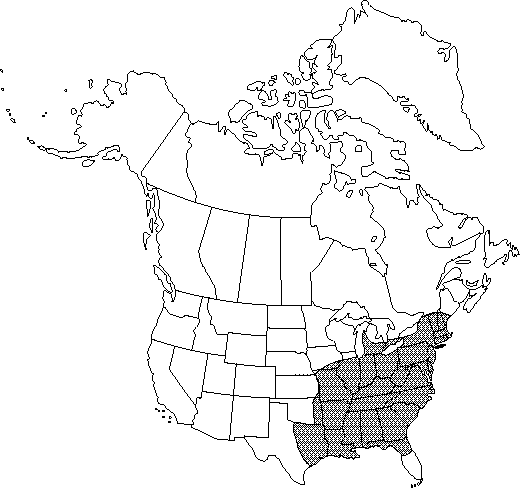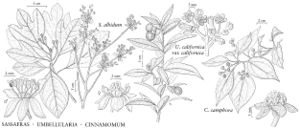Difference between revisions of "Sassafras albidum"
Syst. Laur., 490. 1836.
FNA>Volume Importer |
GeoffLevin (talk | contribs) m (Deleted two invalid or illegitimate names, added a synonym, and added an authority missing in the online version) |
||
| (8 intermediate revisions by 2 users not shown) | |||
| Line 9: | Line 9: | ||
|common_names=Sassafras;white sassafras;filé;gombo filé | |common_names=Sassafras;white sassafras;filé;gombo filé | ||
|special_status={{Treatment/ID/Special_status | |special_status={{Treatment/ID/Special_status | ||
| + | |code=W1 | ||
| + | |label= | ||
| + | }}{{Treatment/ID/Special_status | ||
|code=E | |code=E | ||
|label=Endemic | |label=Endemic | ||
}}{{Treatment/ID/Special_status | }}{{Treatment/ID/Special_status | ||
|code=F | |code=F | ||
| − | |label= | + | |label=Illustrated |
| − | |||
| − | |||
| − | |||
}} | }} | ||
| − | |basionyms={{Treatment/ID/ | + | |basionyms={{Treatment/ID/Basionym |
| − | |name= | + | |name=Laurus albida |
|authority=Nuttall | |authority=Nuttall | ||
| + | |rank=species | ||
| + | |publication_title=Gen. N. Amer. Pl. | ||
| + | |publication_place=1: 259. 1818 | ||
}} | }} | ||
|synonyms={{Treatment/ID/Synonym | |synonyms={{Treatment/ID/Synonym | ||
| − | |name= | + | |name=Laurus sassafras |
|authority=Linnaeus | |authority=Linnaeus | ||
| − | }}{{Treatment/ID/Synonym | + | |rank=species |
| − | |name= | + | }} {{Treatment/ID/Synonym |
| + | |name=Sassafras albidum var. molle | ||
|authority=(Rafinesque) Fernald | |authority=(Rafinesque) Fernald | ||
| − | }}{{Treatment/ID/Synonym | + | |rank=variety |
| − | |name= | + | }} {{Treatment/ID/Synonym |
| − | |authority= | + | |name=Sassafras officinarum |
| − | }}{{Treatment/ID/Synonym | + | |authority=J. Presl |
| − | |name= | + | |rank=species |
| + | }} {{Treatment/ID/Synonym | ||
| + | |name=Sassafras variifolium | ||
|authority=(Salisbury) Kuntze | |authority=(Salisbury) Kuntze | ||
| − | + | |rank=species | |
| − | | | ||
| − | |||
}} | }} | ||
|hierarchy=Lauraceae;Sassafras;Sassafras albidum | |hierarchy=Lauraceae;Sassafras;Sassafras albidum | ||
| Line 45: | Line 49: | ||
}}<!-- | }}<!-- | ||
| − | --><span class="statement" id="st- | + | --><span class="statement" id="st-undefined" data-properties=""><b>Trees,</b> to 35 m. <b>Twigs</b> pale green with darker olive mottling, terete. <b>Leaf</b> blade ovate to elliptic, unlobed or 2-3-lobed (rarely more), 10-16 × 5-10 cm, apex obtuse to acute. <b>Inflorescences</b> to 5 cm, silky-pubescent; floral bract to 1 cm. <b>Flowers</b>: fragrant (sweet, lemony), glabrous; tepals greenish yellow. <b>Staminate</b> flowers: inner 3 stamens with 2 conspicuously stalked glands near base of filament, filament slender; pistillodes usually absent (sometimes present in terminal flower of inflorescence). <b>Pistillate</b> flowers: staminodes 6; style slender, 2-3 mm; stigma capitate. <b>Drupe</b> ca. 1 cm; pedicel reddish, club-shaped, ± fleshy. <b>2n</b> = 48.</span><!-- |
-->{{Treatment/Body | -->{{Treatment/Body | ||
| Line 53: | Line 57: | ||
|distribution=Ont.;Ala.;Ark.;Conn.;Del.;D.C.;Fla.;Ga.;Ill.;Ind.;Iowa;Kans.;Ky.;La.;Maine;Md.;Mass.;Mich.;Miss.;Mo.;N.H.;N.J.;N.Y.;N.C.;Ohio;Okla.;Pa.;R.I.;S.C.;Tenn.;Tex.;Vt.;Va.;W.Va. | |distribution=Ont.;Ala.;Ark.;Conn.;Del.;D.C.;Fla.;Ga.;Ill.;Ind.;Iowa;Kans.;Ky.;La.;Maine;Md.;Mass.;Mich.;Miss.;Mo.;N.H.;N.J.;N.Y.;N.C.;Ohio;Okla.;Pa.;R.I.;S.C.;Tenn.;Tex.;Vt.;Va.;W.Va. | ||
|discussion=<p>Infraspecific taxa have been based on amount of pubescence of leaves and color of young twigs; these taxa are not recognized here.</p><!-- | |discussion=<p>Infraspecific taxa have been based on amount of pubescence of leaves and color of young twigs; these taxa are not recognized here.</p><!-- | ||
| − | --><p>Traditionally, "sassafras tea" was prepared by steeping the bark of the roots (D. S. Correll and M. C. Johnston 1970). It was once considered a relatively pleasant drink. Several indigenous populations used sassafras twigs as chewing sticks, and sassafras root is used occasionally in commercial dental poultices. Sassafras root was one of the ingredients of root beer; this use has now been banned.</p><!-- | + | --><p>Traditionally, "sassafras tea" was prepared by steeping the bark of the roots (D. S. Correll and M. C. Johnston 1970). It was once considered a relatively pleasant drink. Several indigenous populations used sassafras twigs as chewing sticks, and sassafras root is used occasionally in commercial dental poultices. <i>Sassafras</i> root was one of the ingredients of root beer; this use has now been banned.</p><!-- |
--><p>Safrole (p-allylyn ethylenediozybenzene) is found as a minor component in many Lauraceae and as the principal component (80%) of sassafras oil. It is suspected of causing contact dermatitis and of being hallucinogenic, especially in large doses; it is also considered to be both carcinogenic and hepatotoxic (W. H. Lewis and M. P. F. Elvin-Lewis 1977).</p> | --><p>Safrole (p-allylyn ethylenediozybenzene) is found as a minor component in many Lauraceae and as the principal component (80%) of sassafras oil. It is suspected of causing contact dermatitis and of being hallucinogenic, especially in large doses; it is also considered to be both carcinogenic and hepatotoxic (W. H. Lewis and M. P. F. Elvin-Lewis 1977).</p> | ||
|tables= | |tables= | ||
| Line 63: | Line 67: | ||
-->{{#Taxon: | -->{{#Taxon: | ||
name=Sassafras albidum | name=Sassafras albidum | ||
| − | |||
|authority=(Nuttall) Nees | |authority=(Nuttall) Nees | ||
|rank=species | |rank=species | ||
|parent rank=genus | |parent rank=genus | ||
| − | |synonyms= | + | |synonyms=Laurus sassafras;Sassafras albidum var. molle;Sassafras officinalis;Sassafras sassafras;Sassafras variifolium |
| − | |basionyms= | + | |basionyms=Laurus albida |
|family=Lauraceae | |family=Lauraceae | ||
|phenology=Flowering spring (Apr–May). | |phenology=Flowering spring (Apr–May). | ||
| Line 77: | Line 80: | ||
|publication title=Syst. Laur., | |publication title=Syst. Laur., | ||
|publication year=1836 | |publication year=1836 | ||
| − | |special status=Endemic; | + | |special status=W1;Endemic;Illustrated |
| − | |source xml=https:// | + | |source xml=https://bitbucket.org/aafc-mbb/fna-data-curation/src/2e0870ddd59836b60bcf96646a41e87ea5a5943a/coarse_grained_fna_xml/V3/V3_520.xml |
|genus=Sassafras | |genus=Sassafras | ||
|species=Sassafras albidum | |species=Sassafras albidum | ||
| − | |||
| − | |||
| − | |||
| − | |||
| − | |||
| − | |||
| − | |||
| − | |||
| − | |||
| − | |||
| − | |||
| − | |||
| − | |||
| − | |||
| − | |||
| − | |||
| − | |||
| − | |||
| − | |||
| − | |||
| − | |||
| − | |||
| − | |||
| − | |||
| − | |||
| − | |||
| − | |||
| − | |||
| − | |||
}}<!-- | }}<!-- | ||
-->[[Category:Treatment]][[Category:Sassafras]] | -->[[Category:Treatment]][[Category:Sassafras]] | ||
Latest revision as of 12:55, 7 March 2024
Trees, to 35 m. Twigs pale green with darker olive mottling, terete. Leaf blade ovate to elliptic, unlobed or 2-3-lobed (rarely more), 10-16 × 5-10 cm, apex obtuse to acute. Inflorescences to 5 cm, silky-pubescent; floral bract to 1 cm. Flowers: fragrant (sweet, lemony), glabrous; tepals greenish yellow. Staminate flowers: inner 3 stamens with 2 conspicuously stalked glands near base of filament, filament slender; pistillodes usually absent (sometimes present in terminal flower of inflorescence). Pistillate flowers: staminodes 6; style slender, 2-3 mm; stigma capitate. Drupe ca. 1 cm; pedicel reddish, club-shaped, ± fleshy. 2n = 48.
Phenology: Flowering spring (Apr–May).
Habitat: Habitat varied, forests, woodlands, fencerows, old fields (sometimes aggressively colonial), and disturbed areas
Elevation: 0-1500 m
Distribution

Ont., Ala., Ark., Conn., Del., D.C., Fla., Ga., Ill., Ind., Iowa, Kans., Ky., La., Maine, Md., Mass., Mich., Miss., Mo., N.H., N.J., N.Y., N.C., Ohio, Okla., Pa., R.I., S.C., Tenn., Tex., Vt., Va., W.Va.
Discussion
Infraspecific taxa have been based on amount of pubescence of leaves and color of young twigs; these taxa are not recognized here.
Traditionally, "sassafras tea" was prepared by steeping the bark of the roots (D. S. Correll and M. C. Johnston 1970). It was once considered a relatively pleasant drink. Several indigenous populations used sassafras twigs as chewing sticks, and sassafras root is used occasionally in commercial dental poultices. Sassafras root was one of the ingredients of root beer; this use has now been banned.
Safrole (p-allylyn ethylenediozybenzene) is found as a minor component in many Lauraceae and as the principal component (80%) of sassafras oil. It is suspected of causing contact dermatitis and of being hallucinogenic, especially in large doses; it is also considered to be both carcinogenic and hepatotoxic (W. H. Lewis and M. P. F. Elvin-Lewis 1977).
Selected References
None.
